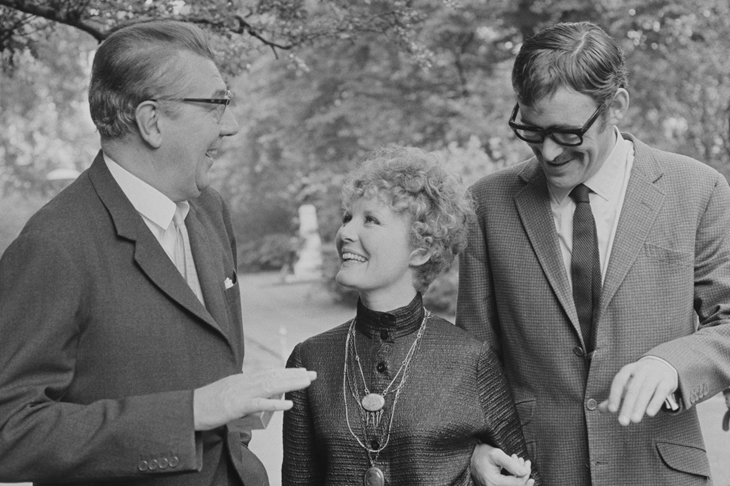As you know, The Spectator Australia Education Research Unit is renowned for the quality of its work. Normally, we shy away from publicity, but we have been encouraged in the public interest to release our findings on the disturbing events at the Trinity Grammar School in Melbourne and what they reveal about the state of education in this country. We should add that we are only able to report on these scandals due to the courageous work of our highly placed source in the college tuck shop (codename Svetlana).
Recently, the entire school was assembled for its annual photograph when the eagle eye of the deputy headmaster fell upon one of the assembled multitude whose hair had crept over the borderline of his shirt collar, in contravention of the school regulations. Now, this deputy head, named Brown (no relation to your humble correspondent) was and still is a popular figure among the students and alumni. So popular is he that he is affectionately known as ‘Brownie’, a sort of Mr Chips who for many years has fulfilled that avuncular role within the ivy-clad cloisters of Trinity. In any event, Brownie took the young miscreant aside, produced a pair of scissors and, like Delilah, lopped several golden locks from his innocent head. Brownie’s popularity, however, could not save him when the school council decided he should be dismissed. His dismissal has divided the school and its wider community. The college council and the Head are on one side, and support Brownie’s dismissal. Arraigned against them are the student body, the alumni and friends.
It might seem strange to you, as it initially did to your correspondent, that a dispute could break out over such a trifling issue as the length of a boy’s hair. On the other hand, if the British could wage the War of Jenkins’ Ear over poor Captain Jenkins having had his ear lopped off by the Spanish coast guard in 1731 and have him produce the offending organ before a parliamentary committee, Trinity Grammar is probably entitled to wage the War of Billy Bunter’s Curls.
Moreover, as with most disputes, the causus belli is really about far deeper issues than appearances might suggest. The real complaint, advanced by the parents, students and old boys, is that the headmaster has been taking the school in some highly inappropriate directions and that Brownie’s sacking is just the outward manifestation of a deeper malaise that has been foisted on this renowned seat of learning. We have to say we agree with them. Our research has revealed, first, that the headmaster has developed an unhealthy pre-occupation with good exam results and the notion of success, to the extent that the parents now claim he has turned the school into an ‘ATAR factory’ and put far too much emphasis on results that are needed to gain admission to a university. Not only has the Head laid it down as a policy that the school should succeed, but he has achieved considerable success in that regard, which is even more concerning. Indeed, before he started at Trinity, the school had been challenged by bad results. The Head, however, has turned this around and the school has in recent years achieved success in obtaining good results for its students. And that is where he went wrong.
The trend of enlightened modern education is that pupils do not need to learn anything, but rather that they should feel comfortable in what they are doing, because they will be happier that way. When this principle is understood, it can readily be seen that success and good exam results are alien and counter-productive to any notion of a good modern education, which should be based solely on equality. We therefore support the unfairly maligned old guard at Trinity in its attempt to prevent the school becoming preoccupied by ideas of success and good exam results which have no place in modern education.
The second concern is that the Head has been unwisely trying to have the school run along sound commercial lines, to make a profit. Here again a moment’s thought may have stopped him from adopting such a reckless policy. Trinity may be a private school; it may well charge $30,000 a year in fees. But it is now part of a structure where governments have been so intimidated into providing private schools with a dazzling array of wellness centres, heated swimming pools and multi-media laboratories at the taxpayers’ expense, that it is utterly destructive even to hint that they are businesses that do not need government handouts.
The third concern is the converse of the unhealthy preoccupation with good results. The role of the school, according to the parents and alumni, has always been to produce young gentlemen of good character, developed through healthy pastimes that bring out the best in young men, like cricket. The pseudo philosophy of work, good grades, success and getting into university has diminished the far more important role of developing character.
Here again, we side with the parents and alumni. Moreover, we are pleased to report that even the headmaster has now seen how the development of gentlemanly character is far more important than success and passing exams. Indeed, he has agreed to introduce special classes after cricket practice to promote that worthy objective: ball tampering, 101 things you can do with sandpaper, composing handy phrases for disparaging the girlfriends of the opposing team and advanced tear-jerking. We are confident these reforms will restore cricket to its rightful place and allow it to continue developing good character at expensive schools. And we hope our research will help return Trinity to its former glory.
Got something to add? Join the discussion and comment below.
Get 10 issues for just $10
Subscribe to The Spectator Australia today for the next 10 magazine issues, plus full online access, for just $10.
You might disagree with half of it, but you’ll enjoy reading all of it. Try your first month for free, then just $2 a week for the remainder of your first year.















Comments
Don't miss out
Join the conversation with other Spectator Australia readers. Subscribe to leave a comment.
SUBSCRIBEAlready a subscriber? Log in